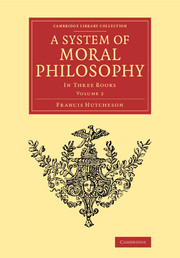
-
Select format
-
- Publisher:
- Cambridge University Press
- Publication date:
- October 2015
- July 2015
- ISBN:
- 9781139583695
- 9781108060295
- Dimensions:
- Weight & Pages:
- Dimensions:
- (229 x 152 mm)
- Weight & Pages:
- 0.62kg, 390 Pages
You may already have access via personal or institutional login
Book description
Often described as the father of the Scottish Enlightenment, Francis Hutcheson (1694–1746) was born in the north of Ireland to an Ulster-Scottish Presbyterian family. Organised into three 'books' that were divided between two volumes, A System of Moral Philosophy was his most comprehensive work. It synthesised ideas that he had formulated as a minister and as the Chair of Moral Philosophy at the University of Glasgow (1729–46). Published posthumously by his son in 1755, prefaced by an account of his life, it is the only treatise by Hutcheson for which a manuscript is known to have survived. Asserting that individual natural rights derive from an innate understanding of moral behaviour, Hutcheson offers a model that mediates between individual interests and communal ideals. Containing the concluding chapters of Book 2 and Book 3, Volume 2 explores the role of familial and political governance in relation to communal happiness.
Contents
Metrics
Altmetric attention score
Full text views
Full text views help Loading metrics...
Loading metrics...
* Views captured on Cambridge Core between #date#. This data will be updated every 24 hours.
Usage data cannot currently be displayed.
Accessibility standard: Unknown
Why this information is here
This section outlines the accessibility features of this content - including support for screen readers, full keyboard navigation and high-contrast display options. This may not be relevant for you.
Accessibility Information
Accessibility compliance for the PDF of this book is currently unknown and may be updated in the future.


